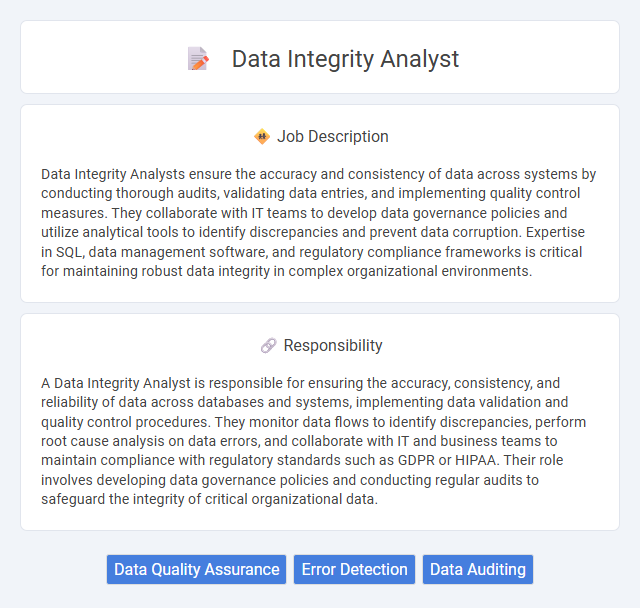
Data Integrity Analysts ensure the accuracy and consistency of data across systems by conducting thorough audits, validating data entries, and implementing quality control measures. They collaborate with IT teams to develop data governance policies and utilize analytical tools to identify discrepancies and prevent data corruption. Expertise in SQL, data management software, and regulatory compliance frameworks is critical for maintaining robust data integrity in complex organizational environments.
Individuals with strong attention to detail and a methodical mindset are likely suitable for a Data Integrity Analyst role, as the job demands accuracy and consistency in verifying data. Those who thrive in structured environments and possess analytical skills tend to perform better in maintaining the quality and reliability of data systems. People who prefer dynamic, unstructured tasks or who lack patience for repetitive processes may find this position challenging.
Qualification
A Data Integrity Analyst typically requires a bachelor's degree in Information Technology, Computer Science, or a related field, with strong proficiency in data management and quality assurance principles. Expertise in SQL, data validation techniques, and familiarity with regulatory standards such as GDPR or HIPAA is essential. Experience with data auditing, error detection, and reporting tools enhances the ability to ensure data accuracy and consistency across enterprise systems.
Responsibility
A Data Integrity Analyst is responsible for ensuring the accuracy, consistency, and reliability of data across databases and systems, implementing data validation and quality control procedures. They monitor data flows to identify discrepancies, perform root cause analysis on data errors, and collaborate with IT and business teams to maintain compliance with regulatory standards such as GDPR or HIPAA. Their role involves developing data governance policies and conducting regular audits to safeguard the integrity of critical organizational data.
Benefit
Data Integrity Analyst roles likely offer enhanced career growth prospects by ensuring accurate and reliable data management, which is crucial for informed business decisions. The position may provide opportunities to work closely with cross-functional teams, improving collaboration skills and gaining industry-specific knowledge. Benefits often include the potential for increased job stability and competitive compensation in sectors prioritizing data accuracy and compliance.
Challenge
Data Integrity Analysts likely face the challenge of ensuring the accuracy and consistency of data across complex systems while managing large volumes of information. They probably encounter difficulties in identifying discrepancies and preventing data corruption in dynamic environments. Maintaining compliance with regulatory standards and adapting to evolving data governance policies could also pose significant obstacles.
Career Advancement
A Data Integrity Analyst plays a crucial role in ensuring data accuracy, consistency, and compliance within an organization, which positions them for career advancement into data governance, data quality management, or business intelligence roles. Mastery of data auditing tools, SQL, and data validation techniques enhances their prospects for promotion to senior analyst or data management positions. Developing expertise in regulatory standards and cross-departmental collaboration further increases opportunities for leadership roles in data strategy and analytics.
Key Terms
Data Quality Assurance
A Data Integrity Analyst ensures the accuracy, consistency, and reliability of datasets by implementing rigorous data quality assurance protocols. They perform regular audits, validate data entries, and identify discrepancies to maintain system integrity across databases. Expertise in SQL, data validation tools, and compliance standards is essential for optimizing data governance and minimizing errors.
Error Detection
A Data Integrity Analyst specializes in identifying and rectifying discrepancies in data sets to ensure accuracy and consistency across databases. Their role involves using advanced validation techniques and automated error detection tools to monitor data quality and prevent corruption. Proficiency in data auditing and anomaly detection algorithms is critical for maintaining reliable information flows and supporting informed business decisions.
Data Auditing
Data Integrity Analysts specialize in data auditing to ensure accuracy, consistency, and reliability across large datasets. They utilize advanced data validation techniques and automated tools to identify discrepancies, errors, and anomalies within databases. Maintaining robust data integrity protocols supports regulatory compliance and enhances overall decision-making processes in organizations.
 kuljobs.com
kuljobs.com